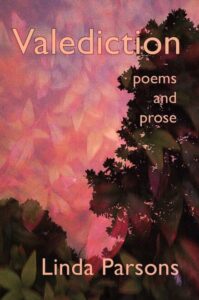 Review by Connie Jordan Green
Review by Connie Jordan Green
Linda Parsons, native Tennessean, is an editor and a prolific writer of poetry, essays, and plays. To come upon a volume of Parsons’ work is to know one is in for a pleasant, but thought-provoking, visit with a master of the written word. Parsons’ sixth collection, Valediction, a book of poems and small essays dedicated to her “three parents, passed but ever present,” is a treasure trove of details and precise images, the product of a reflective mind sifting through memories from childhood and from the recent past.
From the opening poem “Light Around Trees in Morning,” with its praise of what survives and grows, its acknowledgement that “light comes only when we’re bowed” (3), to the final three entries, two poems and an essay, with their vision of a place where the narrator is going “transfigured / as wine to blood” (72), aglow “with the iridescence we’re meant to wear” (73), a place where “the hourglass [is]turned on its side, // spilling [her]own glorious tide” (74), the reader travels safely through pain and pleasure, delight and disappointment, a world where each day is a new window to be opened to allow what waits to enter heart and mind.
Parsons’ people are here—the father creating a harbor of safety, the mother left behind with her “trials and errors” (46), the “torn daughter of in-betweenness” bound for a rescuer, a stepmother who will become “a woman of [her]heart” (11). The poet’s acknowledged angels are her grandmother and her stepmother, but she also recognizes her own role as basket maker for her daughter, her hands weaving the bits of a life into a cradlelike vessel to ease the daughter through that time “looming that neither wants / to speak of or hear” (49).
Prose and poetry work together smoothly to move the reader along a path through the years. The fifteen prose pieces, “essayettes” of a page or less titled “Visitation:…,” function as weft to the warp of forty-eight poems, the two equally strong cords weaving a tapestry of one woman’s life. The essays are no less poetic than the poems, and poetic devices abound in both forms of giving voice: for example, “I have been both the leaving and the left—the seed and the dung—both needed to till the ground and bear fruit” (“Visitation: Mother”). The essays demonstrate the power of prose, a tight fist of images that pummel our senses as effectively as does a well-wrought poem. In Parsons’ skilled hands the prose offerings become stones sewn into the hems of garments worn by those fleeing to safety, a welcome weight ready to be brought to the light, examined as a priceless amulet.
Following in the tradition of Mary Oliver and other poets who looked to nature for inspiration and content, Parsons’ work is literally and figuratively grounded in the earth. The garden with its constant changes, its challenges and rewards, operates as a central motif winding through the poems and small essays, the garden as metaphor for the work of creating a meaningful life. It is a place where the poet at times rips out the encroaching Lenten roses she so loves that threaten the growth of other equally loved plants, but is also the place where she at times surrenders to the garden’s natural movement toward disarray. Much of the work encompassed in the book was created during the shutdown period of the Covid pandemic, a time when the garden became more than ever a place of healing sunlight, a vanquisher of loneliness, and a constant source of creativity. The poet expresses this engulfing role of her garden in “October Foot Washing,” a poem about stepping barefoot onto the cooled earth:
Fall unleaves its script, inking my heels
in the art of dying; the year spins down
to ash and ice. Early dew washes my feet.
The underworld rushes below, the wild cherry
cauls the fence, Jerusalem daisies reach above.
For what is the earth but a tangled bouquet
lit to its core, what am I but a conduit
of ions, the stories that no longer serve me
sent back and back, to the karst, the anthill,
the prints left overnight vanished to shadow (12).
A life is here in these pages of poetry and prose bound together and waiting to be read again and again, each time the words like a loving hand leading us through the maze of a human heart.
Valediction: Poems and Prose by Linda Parsons
Madville Publishing, 2023, 79 pages, $19.95 [paper]
ISBN 9781956440614
Connie Jordan Green is the author of two poetry chapbooks and two collections: Household Inventory, winner of the 2013 Brick Road Poetry Prize, and Darwin’s Breath (Iris Press),with a third collection forthcoming from Madville Publishing. She has taught creative writing and other literary subjects for the University of Tennessee and continues to lead writing workshops. She lives with her husband Richard, a retired engineer, on a farm in East Tennessee.
